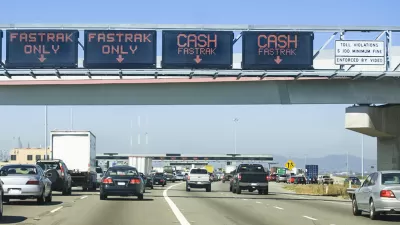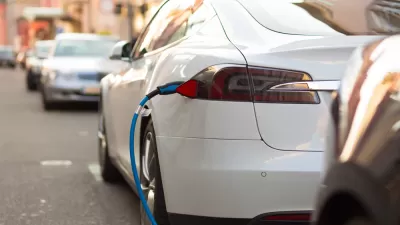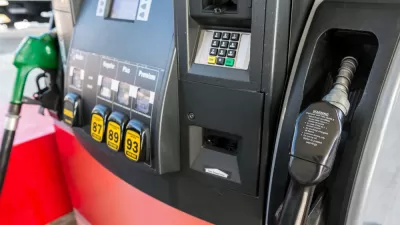It's not funding Trump's much-talked-about infrastructure package, but the 2020 termination date of the FAST Act has state transportation officials urging Congress to hike fuel taxes to sustain the Highway Trust Fund.

Americans are driving more, breaking mileage records that were just set the prior year, putting an end to the "peak car" talk that emerged earlier this decade. However, the increased mileage and even the influx of less fuel efficient sport utility vehicles is not increasing the balance in the Highway Trust Fund, the source of federal funding for roads and transit projects, illustrated by this graph showing the Status of the Highway Trust Fund in fiscal year 2017.
And this has officials from the nation's state departments of transportation who make up the American Association of State Highway and Transportation Officials or AASHTO concerned. Rather than waiting till 2020, the last year of the current five-year transportation reauthorization law know as the Fixing America's Surface Transportation (FAST) Act that was signed by President Obama in December 2015, the association took action last week.
On July 17, the influential organization wrote the Senate Finance Committee and the House Ways and Means committees to ask members of the two tax-writing committees "to consider supporting taxes or user fees" for the trust fund, reports AASHTO Journal. The letters coincide with Congress's goal "to overhaul U.S. tax laws and which could soon move to the center of the congressional agenda."
It should be recognized that the FAST Act provides only a near-term, though absolutely necessary, reprieve when it comes to federal surface transportation funding," AASHTO said.
The focus on sustaining the trust fund rather than the much-hyped, but yet-to-be unveiled $1 trillion infrastructure plan makes sense as tax overhaul will precede infrastructure spending, reports Melanie Zanona for The Hill on July 20.
As for hiking federal user fees, the last time that happened was 23 years ago in 1993 when President Bill Clinton increased fuel taxes by 4.3 cents per gallon to 18.4 cents per gallon for gasoline and 24.4 cents for diesel. Rather than hiking fuel taxes when the trust fund ran low, Washington has chosen to increase funding in other ways, which AASHTO addressed in their letter.
The association said it was "grateful for past efforts to provide general fund transfers" into the trust fund, but that "we do not believe that is a long-term, viable solution upon the expiration of the FAST Act. In addition, AASHTO would strongly oppose the funding reductions" that would hit the HTF in 2021 unless Congress provides additional funding before then.
Those general fund transfers, also called 'offsets' as they may involve resorting to mechanisms (sometimes referred to as gimmicks) to avoid increasing the deficit, began in 2008 under the Bush administration and totaled over $135 billion with the passage of the FAST Act in December 2015.
However, the AASHTO letter left the door open to "some" general fund diversions.
"Therefore, we encourage the committee to consider supporting taxes or user fees that provide additional receipts into the HTF," it said.
The balance of the letter points to revenue options that AASHTO has identified – ranging from increasing the levels of existing trust fund excise taxes on motor fuels or heavy trucks, to diverting some existing federal revenue sources into the Highway Trust fund or levying new user fees such as taxes on cargo container shipments or on tires for light-duty vehicles similar to those now assessed on heavy truck tires.
FULL STORY: l AASHTO Urges Congressional Tax Writers to Consider New Taxes, Fees for Trust Fund

Study: Maui’s Plan to Convert Vacation Rentals to Long-Term Housing Could Cause Nearly $1 Billion Economic Loss
The plan would reduce visitor accommodation by 25,% resulting in 1,900 jobs lost.

Alabama: Trump Terminates Settlements for Black Communities Harmed By Raw Sewage
Trump deemed the landmark civil rights agreement “illegal DEI and environmental justice policy.”

North Texas Transit Leaders Tout Benefits of TOD for Growing Region
At a summit focused on transit-oriented development, policymakers discussed how North Texas’ expanded light rail system can serve as a tool for economic growth.

Nevada Bills Aim to Establish Home Insurance Assurance Amidst Wildfire Risk
Republican sponsor hopes the FAIR plan would be “a true market of last resort.”

Virginia Law Allows Judges to Mandate Speed Limiters
The law could set a new precedent for speed limiting tech on U.S. vehicles.

Comment: EPA Cuts will Send Atlanta Back to Eye-burning Ozone, Lung-damaging Smog, and Raw Sewage in the Chattahoochee River
A veteran political journalist takes stock of the hard-earned ground Georgia stands to lose with slashed environmental protection.
Urban Design for Planners 1: Software Tools
This six-course series explores essential urban design concepts using open source software and equips planners with the tools they need to participate fully in the urban design process.
Planning for Universal Design
Learn the tools for implementing Universal Design in planning regulations.
City of Santa Clarita
Ascent Environmental
Institute for Housing and Urban Development Studies (IHS)
City of Grandview
Harvard GSD Executive Education
Toledo-Lucas County Plan Commissions
Salt Lake City
NYU Wagner Graduate School of Public Service





























